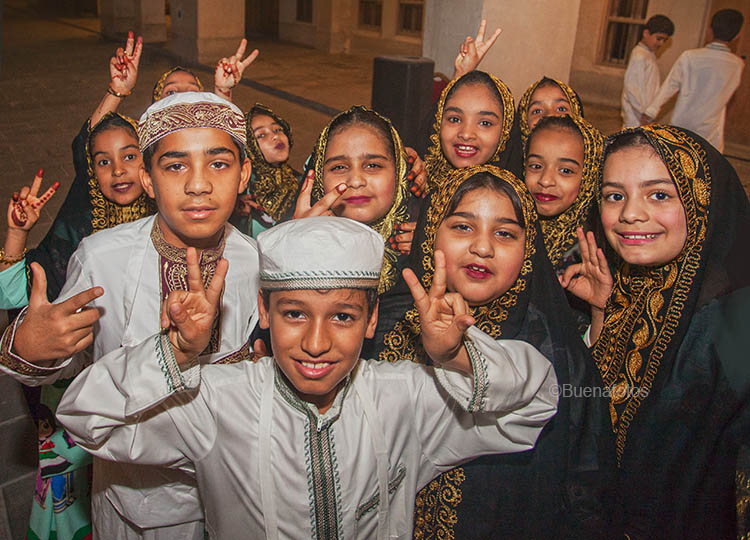Garangao (Garanga’oh), also known as Gargee’an, Gargaaown or Laylat Garanga’oh (Garanga’oh Night), is celebrated in the mid-month night of Ramadan. The Qatari society celebrates Garangao on the 14th day of Ramadan.
Starting right after Iftar, children gather in their vibrant traditional costumes in each neighbourhood and start wandering, going from door to door, chanting a special Garangao rhyme while holding cloth sacks to fill them with goodies (similar to Halloween). The night continues after the evening prayers until the late hours of the night. The adults gather at home waiting for the youngsters to show up to fill their sacks with sweets and nuts. Families pay short visits to each other and exchange greetings and dishes.

Often during Garangao, while the kids are out collecting sweets, nuts, and even money, other family members gather together in their houses and celebrate Ramadan. Garangao is a great time for people to get together and enjoy the company of family.
Garangao rewards children for fasting during the first half of Ramadan and encourages them to continue to fast during the second half of the month. It also aims to thank Al Mosaher, an individual who dedicates his time to wake people up for suhoor meals throughout Ramadan.
Common across the GCC, Garangao has been celebrated in the region for decades. Although known as Garangao in Qatar and Bahrain, it’s also referred to as Haq al Laylah (Due of the Night) or Haq Allah (God’s Due) in the UAE; Al Garangashooh or Al Tolbah (The Request) in Oman; and Laylat Garga’an in Saudi Arabia and Kuwait.

In Qatar, Garangao has become more than just a traditional ‘trick-or-treat’ night. In order to preserve this folk heritage, schools, organisations, hotels, and some clubs celebrate the event by giving away folk dishes, sacks of Garangao sweets and nuts, and playing folk games. Many venues in Qatar and even the hotels celebrate the night and invite the public, both Qatari and non-Qatari, to join the celebrations and the distribution of goodie-bags, applying henna, face-painting, and listening to and narrating stories.
The Garangao rhyme:
Garangao Girga’oh
Atoona Allah yateekum (Give us what god gave you)
Bayt Mecca ya wadeekum (To the house of Mecca, he will take you)
Ya Mecca Yal mamoora (The great, timeless Mecca)
Yam il salasil wal thahab ya noora (Covered with chains, gold, and light)
Atoona min mal Allah (Give us from God’s money)
Yislam lakum Abdulla (Abdulla greets you)
The song usually ends with the family name or the name of the father of the house. So the ending of the song goes as:
Atoona dahbat leefa (Please give us some sweets)
Salam ala [name of the singer] (Please send regards to)
Author: Ola Diab
Copyright © Marhaba Information Guide. Reproduction of material from Marhaba Information Guide’s book or website without written permission is strictly prohibited. Using Marhaba Information Guide’s material without authorisation constitutes as plagiarism as well as copyright infringement.





